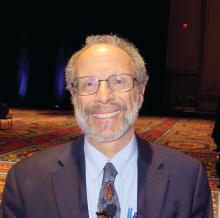The best available literature on the topic shows that about one in six psychiatrists reports having more than five patient suicides during an entire career. “There are two issues here,” Dr. Gitlin said. “One is, because it’s such an infrequent event, nobody has a big enough series to write about. The other issue is, because it’s so infrequent, nobody learns particularly well how to cope with it. You can’t become an oncologist if you’re really phobic and overwhelmed every time a patient dies. But it happens infrequently enough in psychiatry that nobody really masters a way of coping.”
Younger age and lesser clinical experience are most powerful predictors of distress. In fact, over a 3-year training period, about one-third of psychiatry residents will have a patient commit suicide. “Is that because our young colleagues just don’t know what to do and they’re not as thoughtful and as wise, and have as good a judgment as we have and do?” Dr. Gitlin asked. “Of course not. It’s because we give the most ill patients to the people with the least experience. Residents treat much more psychiatrically ill patients, who therefore have a higher risk of suicide.”
Responses are wide-ranging and are similar to other meaningful losses in life. One study found that about 38% of psychiatrists experience levels of distress in the first few weeks after a patient suicide, which is comparable to that of a clinical population (Am J Psychiatry. 2004;161:1442-6). “If you take those same people and follow them out, that level drops rather precipitously, from 38% to 5% or 10%,” Dr. Gitlin said. “That means that it feels like an acute stress reaction. By 6 months, the effect has faded significantly. One-third of psychiatrists will say that when a patient commits suicide, it affects their personal life to some significant degree, and 15% say they thought about retirement. But if you push them on it, only about 3% think about it seriously.”
Typically, the first stage of response to a patient suicide is denial, which might include an overwhelming feeling of shock or a sense of depersonalization and de-realization, “where there’s a numbness that kind of shuts you down, because the effect is too overwhelming,” he said. Reflecting on the patient who took his own life as Dr. Gitlin was beginning his career, he said, “I didn’t have denial with this young man; I had depersonalization, where for the next few weeks I was at UCLA hanging out with psychiatrists and I felt like there was some film between me and everybody else.

